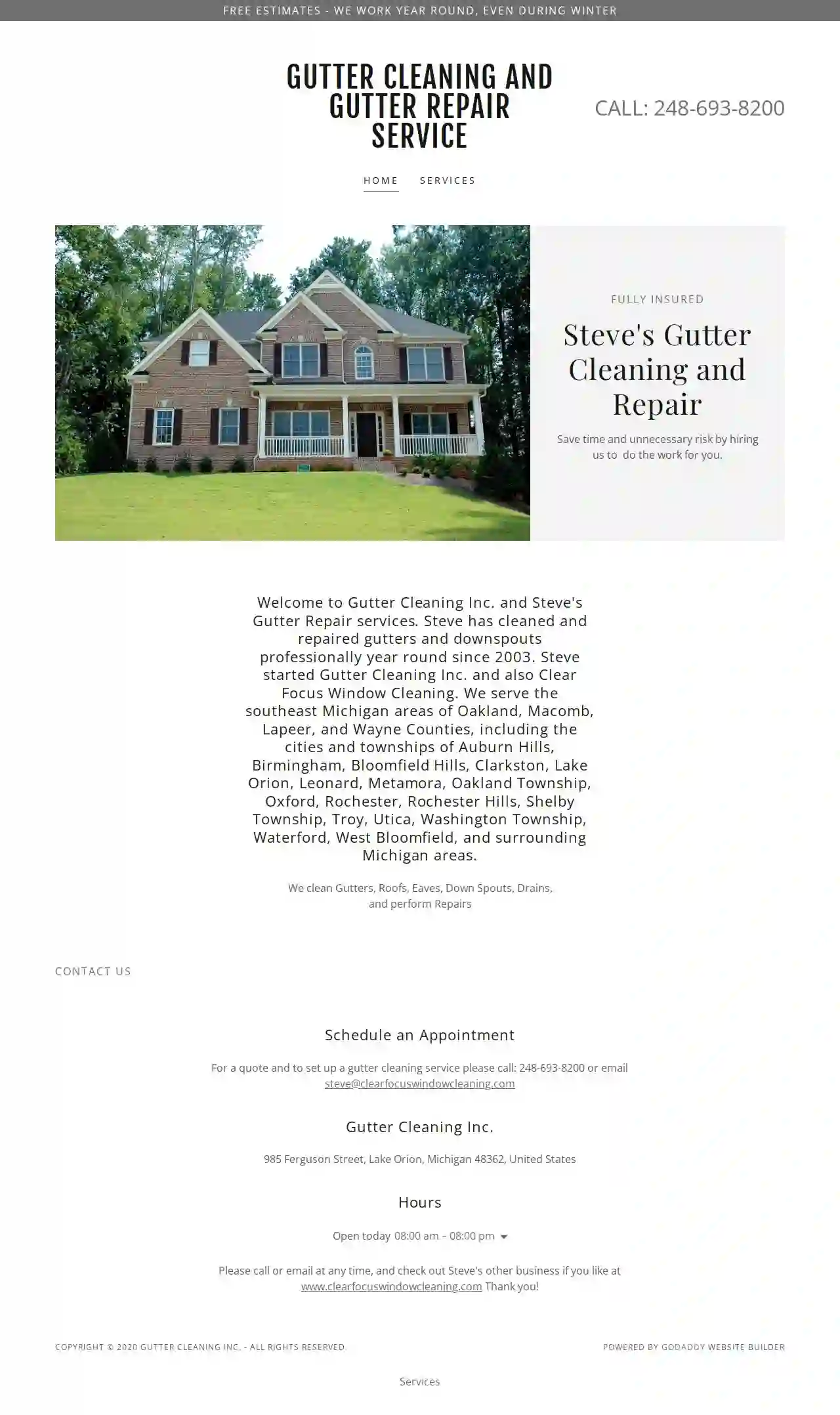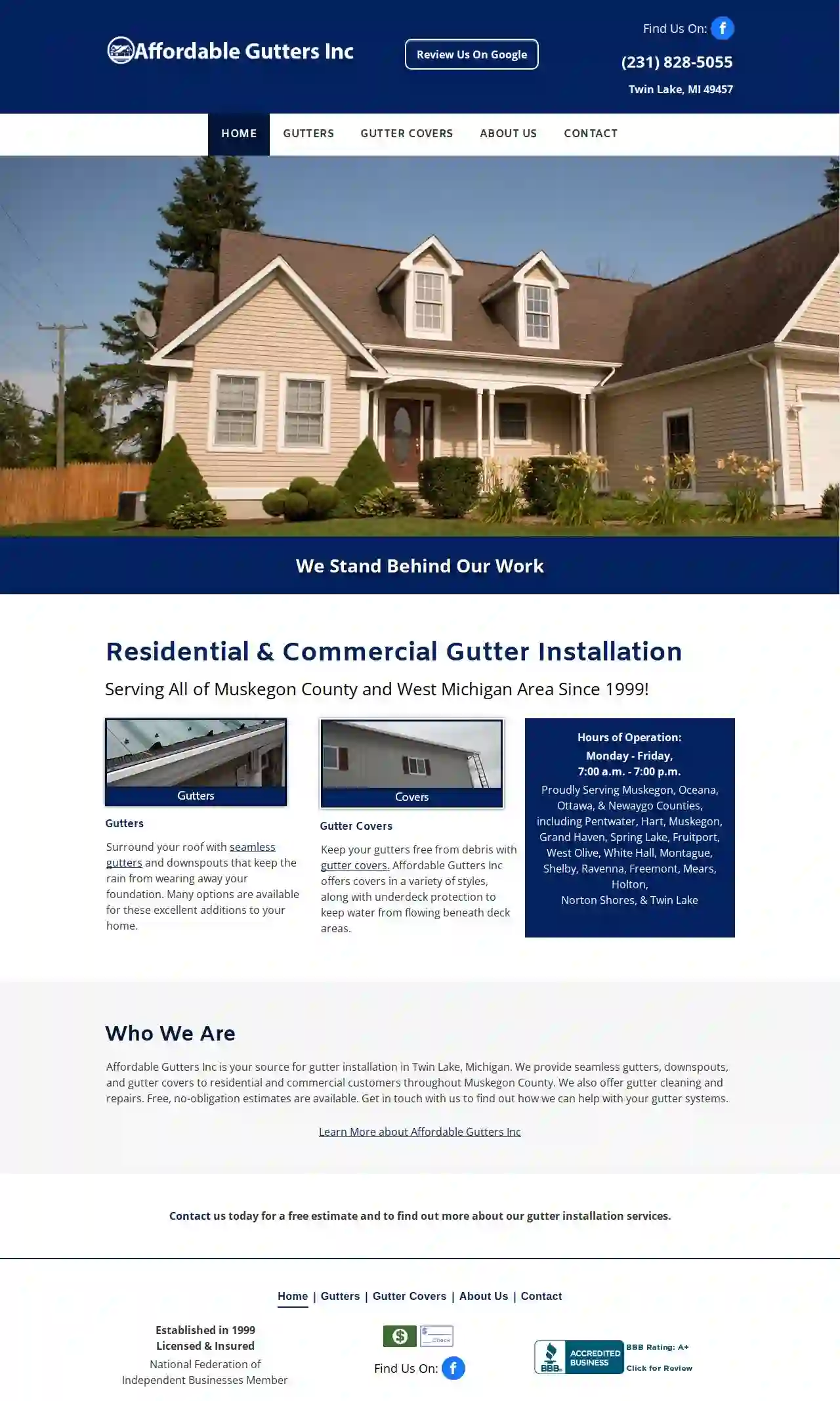Gutter Cleaning Grand Blanc
Find Gutter Cleaning and Repair in Grand Blanc
Get up to 3 Gutter Cleaning quotes for your project today! Compare profiles, reviews, accreditations, portfolio, etc... and choose the best deal.

Clean Fantastic
4.832 reviewsWindsor, USWelcome to Clean Fantastic Window Cleaning, Your Local Exterior Cleaning and Sanitizing Specialists. We are a family firm that has been built on customer referrals time after time. We offer free quotations, friendly professional service at a price you can trust. We are licensed, bonded, and insured for your peace of mind. We have an excellent reputation and can provide local references from homes and businesses in your area. Our services include House Washing/Exterior Building Cleaning, Window Cleaning, Gutter Cleaning, Power Washing, Vinyl Siding Cleaning, Office Cleaning, and Shop Front cleaning and signage as well as Driveway Sealing and Property Maintenance. We clean windows up to 65 ft high! Our team is available to cover your window cleaning, house washing, vinyl siding cleaning, power washing, gutter cleaning, and take care of your home or business efficiently and effectively with 100% client satisfaction.
- Services
- Why Us?
- Testimonials
- Gallery
Get Quote
Art of Stone Masonry & Fireplace
4.878 reviewsDetroit, USArt of Stone Masonry & Fireplace is a team of dedicated professionals serving Macomb, Oakland, and Wayne Counties. We take pride in our work, providing expert masonry and fireplace services to enhance the beauty and functionality of your home. From chimney sweeps and gas log installations to intricate stone veneers and driveway construction, we handle it all with precision and care. Our commitment to quality is reflected in our 5-year warranty on new builds and our membership in the National Chimney Sweep Guild. We are fully insured and licensed, ensuring your peace of mind. Contact us today for a free quote and let us transform your vision into reality.
- Services
- Why Us?
- Accreditations
- Testimonials
- Gallery
Get Quote
Gutter Cleaning Inc
54 reviews985 Ferguson Street, Lake Orion, 48362, USSave time and unnecessary risk by hiring us to do the work for you. Welcome to Gutter Cleaning Inc. and Steve's Gutter Repair services. Steve has cleaned and repaired gutters and downspouts professionally year round since 2003. Steve started Gutter Cleaning Inc. and also Clear Focus Window Cleaning. We serve the southeast Michigan areas of Oakland, Macomb, Lapeer, and Wayne Counties, including the cities and townships of Auburn Hills, Birmingham, Bloomfield Hills, Clarkston, Lake Orion, Leonard, Metamora, Oakland Township, Oxford, Rochester, Rochester Hills, Shelby Township, Troy, Utica, Washington Township, Waterford, West Bloomfield, and surrounding Michigan areas. We clean Gutters, Roofs, Eaves, Down Spouts, Drains,and perform Repairs. Contact Us Schedule an Appointment For a quote and to set up a gutter cleaning service please call: 248-693-8200 or email [email protected] Gutter Cleaning Inc. 985 Ferguson Street, Lake Orion, Michigan 48362, United States Hours Open today 08:00 am – 08:00 pm Please call or email at any time, and check out Steve's other business if you like at www.clearfocuswindowcleaning.com Thank you!
- Services
- Why Us?
- Our Team
- Gallery
Get Quote
Affordable Gutters
53 reviewsTwin Lake, 49457, USAffordable Gutters Inc is your source for gutter installation in Twin Lake, Michigan. We provide seamless gutters, downspouts, and gutter covers to residential and commercial customers throughout Muskegon County. We also offer gutter cleaning and repairs. Free, no-obligation estimates are available. Scott Groeneveld - Owner/Operator Scott started this business with his father in 1999. His father retired a few years ago and now Scott continues in his stead, leading a crew of skilled workers whom he trained and supervises to ensure the highest-quality workmanship. Scott is very familiar with the Twin Lake, Michigan, area since he was raised and resides here. His clients are his neighbors, as well as his friends. He is active in the community.
- Services
- Why Us?
- Our Team
- Testimonials
- Gallery
Get Quote
Grand Rapid Gutters
51 reviewsGrand Rapids, MI, USGrand Rapids Gutters is a locally owned and operated gutter service company serving the Grand Rapids, MI area. We offer a full range of gutter services, including cleaning, repair, and installation. Our experienced technicians are dedicated to providing high-quality workmanship and exceptional customer service. We understand the importance of properly functioning gutters for protecting your home from water damage, and we are committed to ensuring your complete satisfaction. We offer free estimates on all of our services, so contact us today to learn more about how we can help keep your gutters in top condition.
- Services
- Why Us?
- Accreditations
- Testimonials
- Gallery
Get Quote
Livingston Gutter Inc.
426 reviews2723 East Grand River Ave., Howell, 48843, USWelcome to Livingston Gutter, Inc.! We're a premier gutter installation and servicing company based in Howell, MI. Our team of experts specializes in gutter cover installation, seamless gutter installation, gutter servicing, gutter cleaning, and siding, soffit, and fascia services. With over 20 years of experience, we've built a reputation for providing top-notch services to our customers. Contact us today to learn more about our services and how we can help you with your gutter needs.
- Services
- Why Us?
- Gallery
Get Quote
Rainbow Mist Pressure Washing & Handyman Services
4.17 reviewsDetroit, USAt Rainbow Mist Pressure Washing, we believe in keeping things neat and tidy. Mold, mildew, water deposits and oil stains are no problem for us. From porches to siding, we will leave your home looking like it belongs at the end of a rainbow! We also offer professional handyman services to help with those pesky household tasks. Whether it's a flickering light switch, a leaky faucet, or a larger home improvement project, our team is here to help. We pride ourselves on doing the very best to keep your home in tip-top condition.
- Services
- Why Us?
- Gallery
Get Quote
The Gutter Doctor Plus
4.2138 reviewsAnn Arbor, USThe Gutter Doctor Plus has served the Ann Arbor area for more than 40 years. Our expert installers have the experience and skill to tackle any of your residential or commercial gutter needs. Receive a free price quote on any of our services by browsing our offerings below. We service and carry all styles, sizes, shapes and models of gutter systems and gutter guards to fit any budget. Our patented Pro-Gutter Guard brand of gutter guards ensure you stay off the ladder, and Never clean your gutters again! As long as your gutters are repairable, we can repair them. Don’t waste money on amateur’s or attempt homemade solutions. Our Seamless Gutters are made onsite, and installed properly, backed by our unlimited warranty. We offer 60+ colors and styles. Gutter cleaning is vital to maintaining the health & longevity of your home. Regular gutter maintenance prevents water damage, pests, and roof deterioration. We service and install gutters on any sized commercial building. We offer 6″ and other large sized commercial styles. Our honesty, integrity, and professionalism make us the premier source for gutter installation, gutter repair, gutter cleaning and gutter guards in the Ann Arbor, Michigan area. Family owned and operated, we treat you like family. In every category: Price, Quality, Responsiveness, Punctuality, and Professionalism. We stand behind our products and services, which is why we offer one of the best warranties in the business. We offer the best gutter guards in the industry that offers 24-hour protection 365 days a year! Gutter guards protect your gutters from the elements and keeps you from risking your own life on an unsafe ladder. The Gutter Doctor Plus stand behind all of our work and guarantee customer satisfaction with every job.
- Services
- Why Us?
- Testimonials
- Gallery
Get Quote
Michigan Gutters Inc.
533 reviews1616 W. South Airport Rd., Traverse City, 49686, USIntroducing Alu-Rex Continuous Hanger™ System The Next Generation of Gutter Maintenance and Stability. Learn More Seamless Half Round Gutters Half Round Gutters are a unique and distinctive design, giving your home a historic and classy feel. Learn More Residential & Commercial Seamless Gutters Seamless Gutters are nationally recognized as the most popular form of gutters installed. Learn More Gutter Protection Gutter protection keeps leaves and debris out of your gutters. Doing so not only improves the functionality of your gutters, but also keep you safe off the ladder. Learn More Ice Dam Solutions The icicles may be pretty to look at, and be a common sight during the winter months, but they could be causing costly damage to your home. Call us for ice dam steaming, or a free heat estimate! Learn More Heated Gutter & Snow Retention Systems Learn More Under Deck Drainage The space under decks, especially if you have a walkout basement, is not quite as useful as it could be if there was a solution to stop the rain from dripping through. Learn more Creative Downspout Options Rain Chains are a beautiful and functional alternative to traditional closed metal or plastic downspouts. Contact Us Residential and Commercial Seamless Gutters, Gutter Covers, Heated Gutter Systems, Snow Retention Systems, Drain Tile, Cleaning & Maintenance in Northern Michigan! If there is one thing that we care about, it's our customers. We strive for customer satisfaction in every process of our business. Michigan Gutters, Inc, offers a wide selection of materials and information for the best job at the best price. Our materials are the highest quality available and are installed by experienced and well-trained experts with years of experience. Request a free estimate today. Michigan Gutters Inc. is the largest seamless gutter installation company in Michigan. Locally owned and operated since 1994, we are headquartered in Traverse City Michigan with a second warehouse in Gaylord, MI. This is only possible by taking extreme pride in our work and taking care of our customers like they are part of our own family. Let us help protect your home. We will contact you at YOUR convenience. No hassle, no pressure. We pride ourselves on helping you to determine the best long term solution for your seamless gutter needs, always keeping your best interest in mind. Click here to check out our blog!! Licensed & Insured
- Services
- Why Us?
- Gallery
Get Quote
Clean Machine
512 reviewsSaranac, MI, 5285 Morrison Lake Rd, 48881, USBRIGHTEN UP YOUR HOMEGive Us A Call Today! 616-843-6835 Contact Us House Washing Roof Cleaning Driveway Washing Christmas Lighting PRESSURE WASHING COMPANY IN GRAND RAPIDS, MI! When you need five-star, reliable pressure washing in Grand Rapids, The Clean Machine is here to help! Professional pressure washing is our passion, and our aim is satisfaction. With our long list of comprehensive exterior cleaning services, we offer Grand Rapids locals everything they need to get their properties clean and keep them clean from top to bottom! When performed by careful, experienced, and insured experts, pressure washing can be a great way to ensure your property looks beautiful, stays sanitary, and keeps healthy and sturdy for the long run. The Clean Machine proudly helps both commercial and residential clients with a variety of specialty cleaning and maintenance services. If you need a pressure washing pro you can trust, you can count on the team at The Clean Machine. We'd love to serve you. Get in touch and call us today for a free pressure washing estimate at 616-843-6835. Read More AREAS WE SERVICE Grand Rapids East Grand Rapids Rockford Plainfield Ionia Hudsonville Caledonia Grandville Grand Haven Sparta Saranac View All Areas WHY HIRE The Clean Machine? Professional & Reliable Our technicians are hard-working pros. You count on them to be respectful, punctual, honest, and dependable. Fully Insured & Background Checked All our staff is background checked, giving our customers peace of mind when it comes to the people working on their properties. Plus, if there's ever any issue with our work, we are fully insured. 100% Customer Satisfaction Simply put, our job isn't done if you're not fully satisfied. We work hard and tune into our client's needs to get the job done right on the first try. Commercial-Grade Equipment To produce perfect results, you need the right tools. Our team works with commercial-grade equipment that allows us to tackle any mess we encounter, no matter how tough. Contact Us Today RESIDENTIAL CLEANING SERVICES House Washing Roof Cleaning Driveway Washing Patio Cleaning Deck Cleaning Window Cleaning Gutter Cleaning Christmas Lighting Dryer Vent Cleaning View Our Services PROTECT YOUR HOME IN GRAND RAPIDS WITH OUR HOUSE WASHING SERVICES House washing, along with roof cleaning and window washing, keeps your home visually appealing while protecting it from harmful contaminants like algae, grime, and mildew. It's an easy way to extend the life of your home's exterior surfaces and keep them looking their best.
- Services
- Why Us?
- Our Team
- Testimonials
- Gallery
Get Quote
Over 60,241+ Cleaning Services in our network
Our janitorial contractors operate in Grand Blanc and beyond!
CleaningMatch has curated and vetted Top Cleaning Companies in and around Grand Blanc. Find a top & reliable contractor today.
Frequently Asked Questions About Gutter Cleaning
- Safety: Installing gutter guards involves working at heights, which can be dangerous. Ensure you have a stable ladder and someone to spot you.
- Proper Fit: Gutter guards must be installed correctly to function properly. Improper installation can lead to leaks or reduced effectiveness.
- Gutter Compatibility: Not all gutter guards are compatible with all gutter types. Choose gutter guards specifically designed for your gutter system.
- Tools and Materials: You'll need tools like a ladder, measuring tape, screws or fasteners, and possibly a saw or snips to cut the gutter guards to size.
- Visible Debris: You can see leaves, twigs, and other debris accumulated in your gutters from the ground.
- Sagging Gutters: Gutters that are filled with debris become heavy and can sag or pull away from the house.
- Water Overflowing: During rainfall, water spills over the sides of your gutters instead of flowing through the downspouts.
- Water Stains: Water stains on your siding or foundation indicate that your gutters are overflowing.
- Plant Growth: Plants or moss growing in your gutters indicate standing water and a lack of proper drainage.
- Reduce Gutter Cleaning Frequency: Gutter guards significantly reduce the amount of debris that accumulates in your gutters, reducing the need for frequent cleaning.
- Prevent Clogs and Water Damage: By keeping gutters clear, gutter guards help prevent clogs that can lead to water damage.
- Reduce Pest Infestations: Gutter guards can deter pests like birds, squirrels, and insects from nesting in your gutters.
- Extend Gutter Lifespan: By preventing debris buildup, gutter guards protect your gutters from corrosion and damage, extending their lifespan.
- Safety: Cleaning gutters involves working at heights, which can be dangerous. Ensure you have a stable ladder and someone to spot you.
- Equipment: You'll need a ladder, gloves, a bucket, a gutter scoop, and possibly a hose or pressure washer.
- Time and Effort: Gutter cleaning can be time-consuming and physically demanding, especially if you have a large house or multiple stories.
- Debris Disposal: You'll need to dispose of the collected debris properly.
Can I install gutter guards myself?
If you're comfortable working at heights, have the necessary tools and experience, and are confident in your ability to install gutter guards correctly, DIY installation is an option. However, for professional results and a safer approach, hiring a professional gutter guard installer is recommended.
How do I know if my gutters need cleaning?
If you notice any of these signs, it's time to schedule a gutter cleaning.
What are gutter guards, and do I need them?
Benefits of Gutter Guards:
While gutter guards are an effective way to minimize gutter maintenance, they don't eliminate it entirely. Regular inspection and occasional cleaning are still recommended. If you're tired of frequent gutter cleaning or concerned about water damage, gutter guards are a worthwhile investment.
Can I clean my own gutters?
DIY Gutter Cleaning Considerations:
If you're comfortable working at heights, have the necessary equipment, and are willing to invest the time and effort, DIY gutter cleaning is an option. However, for safety, convenience, and professional results, hiring a gutter cleaning service is often a better choice.
Can I install gutter guards myself?
- Safety: Installing gutter guards involves working at heights, which can be dangerous. Ensure you have a stable ladder and someone to spot you.
- Proper Fit: Gutter guards must be installed correctly to function properly. Improper installation can lead to leaks or reduced effectiveness.
- Gutter Compatibility: Not all gutter guards are compatible with all gutter types. Choose gutter guards specifically designed for your gutter system.
- Tools and Materials: You'll need tools like a ladder, measuring tape, screws or fasteners, and possibly a saw or snips to cut the gutter guards to size.
If you're comfortable working at heights, have the necessary tools and experience, and are confident in your ability to install gutter guards correctly, DIY installation is an option. However, for professional results and a safer approach, hiring a professional gutter guard installer is recommended.
How do I know if my gutters need cleaning?
- Visible Debris: You can see leaves, twigs, and other debris accumulated in your gutters from the ground.
- Sagging Gutters: Gutters that are filled with debris become heavy and can sag or pull away from the house.
- Water Overflowing: During rainfall, water spills over the sides of your gutters instead of flowing through the downspouts.
- Water Stains: Water stains on your siding or foundation indicate that your gutters are overflowing.
- Plant Growth: Plants or moss growing in your gutters indicate standing water and a lack of proper drainage.
If you notice any of these signs, it's time to schedule a gutter cleaning.
What are gutter guards, and do I need them?
Benefits of Gutter Guards:
- Reduce Gutter Cleaning Frequency: Gutter guards significantly reduce the amount of debris that accumulates in your gutters, reducing the need for frequent cleaning.
- Prevent Clogs and Water Damage: By keeping gutters clear, gutter guards help prevent clogs that can lead to water damage.
- Reduce Pest Infestations: Gutter guards can deter pests like birds, squirrels, and insects from nesting in your gutters.
- Extend Gutter Lifespan: By preventing debris buildup, gutter guards protect your gutters from corrosion and damage, extending their lifespan.
While gutter guards are an effective way to minimize gutter maintenance, they don't eliminate it entirely. Regular inspection and occasional cleaning are still recommended. If you're tired of frequent gutter cleaning or concerned about water damage, gutter guards are a worthwhile investment.
Can I clean my own gutters?
DIY Gutter Cleaning Considerations:
- Safety: Cleaning gutters involves working at heights, which can be dangerous. Ensure you have a stable ladder and someone to spot you.
- Equipment: You'll need a ladder, gloves, a bucket, a gutter scoop, and possibly a hose or pressure washer.
- Time and Effort: Gutter cleaning can be time-consuming and physically demanding, especially if you have a large house or multiple stories.
- Debris Disposal: You'll need to dispose of the collected debris properly.
If you're comfortable working at heights, have the necessary equipment, and are willing to invest the time and effort, DIY gutter cleaning is an option. However, for safety, convenience, and professional results, hiring a gutter cleaning service is often a better choice.